10 Years of Impact

Megan Taylor
Managing Director
Reflections on the project
In our work over the last decade, one thing has become clear: creating space for quality reflection and deeper connection is a strategic imperative for achieving sustainable growth and working through the complex challenges we face on a daily basis. These practices help us to make better decisions, enable more effective collaboration and avoid costly reactive cycles that often drain time and resources.
While this insight isn’t groundbreaking, far from it, that’s precisely why it matters. By slowing down, listening deeply, and learning from our experiences, we can access the power of how we lead and collaborate. 64% of respondents in our 10 Years of Impact survey reported that adopting these practices led to significantly increased connection, understanding, and collaboration across functions or regions. This, in turn, resulted in more effective strategy launches, better handling of key challenges, and a more thoughtful approach to navigating unforeseen disruptions such as the COVID-19 pandemic. The benefit was clear.
Read more
Yet, despite the growing recognition of their value, reflective and connective spaces are the first to go when the demands of daily life mount up. Many respondents in our research spoke of how quickly groups fragmented during tough times or when the space wasn’t actively maintained. Even when organisations understand the importance of these spaces, they often struggle to sustain them amidst the constant rush to meet deadlines. Slowing down feels counterintuitive in an environment that prioritises urgency, and there’s often fear that open reflection might be seen as unproductive, or even risky, especially in environments where power is tightly held. The discomfort of questioning our actions is easily set aside as teams revert to “business as usual” to avoid the tension.
This pattern leaves people, teams, and organisations vulnerable to reactive cycles, feeling fragmented, overwhelmed, and trapped in short-term thinking. So, if creating and maintaining these spaces isn’t a luxury but a necessity, the question isn’t why they matter but how we can prioritise them amid daily demands.
Over the past decade, we’ve observed that organisations that embed reflective and relational practices into their leadership development and daily rhythms are better equipped to work through their challenges. 75% of respondents reported that this work significantly improved their capacity to lead through continuous change. These practices aren’t about finding the right answers—they’re about creating conditions for us to think and relate differently to one another and the issues we face. They encourage us to engage with doubt and dilemma rather than attempting to eliminate them—because, quite simply, we can’t.
Reflective practices allow us to slow down, not to escape action, but to think more critically about it—to reconsider not only what we’re doing but why and how. These moments of reflection are crucial for navigating the messy realities of leadership, where multiple perspectives, contradictions, and the unpredictability of human behaviour can’t be ignored. Without these spaces, leaders risk getting trapped in cycles of surface-level problem-solving, addressing symptoms instead of underlying causes.
Equally important are relational practices - creating environments where trust, open dialogue, and greater awareness of ourselves and others can develop. Organisations are networks of human relationships where power, influence, and emotions shape every interaction. Through these practices, leaders learn to listen better, navigate tricky dynamics, and understand their role in shaping the culture and outcomes around them.
In reflecting on our 10-year journey, we’ve done just what we encourage our clients to do: slow down, question, and learn from our work. This process has led us to adapt our methodology, highlighting the practices we believe are most important. Central to this is our Collaboration Compass, a lightly held framework that encourages us to focus on the key dynamics of being, thinking, doing, and relating. While it’s not a clear solution, it helps people stay grounded in the practices that support meaningful change.
This report shares stories, data, and insights from our work over the past decade, and we hope it sparks reflection and action within your organisation. These practices shouldn’t be seen as add-ons or training removed from the day-to-day—they are central to how we work, lead, and collaborate every day. If we prioritise them, we can work through the challenges we face more thoughtfully and effectively. And that can only be a good thing.
10 years at a glance
The metrics give a snapshot of our focus over the past decade. They’re useful, but it’s the stories and patterns behind them that bring our work to life.
Organisations we supported
Length of client partnership
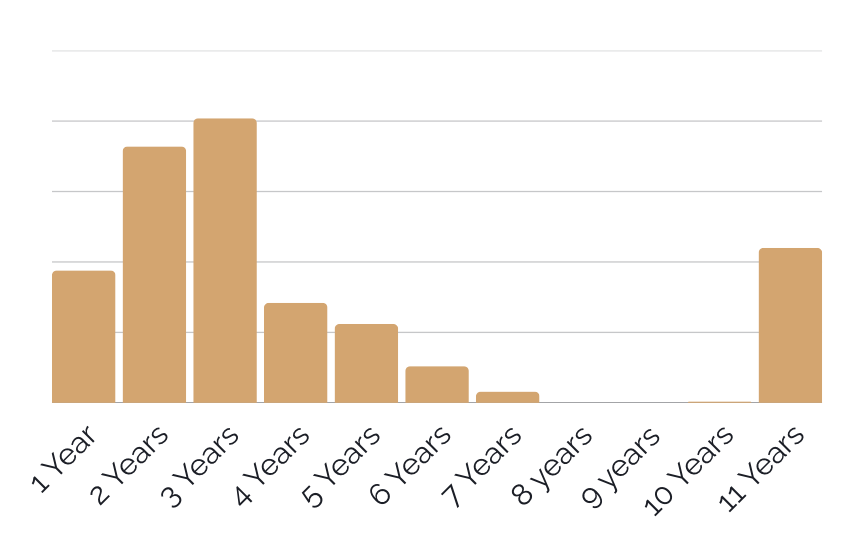
Sectors
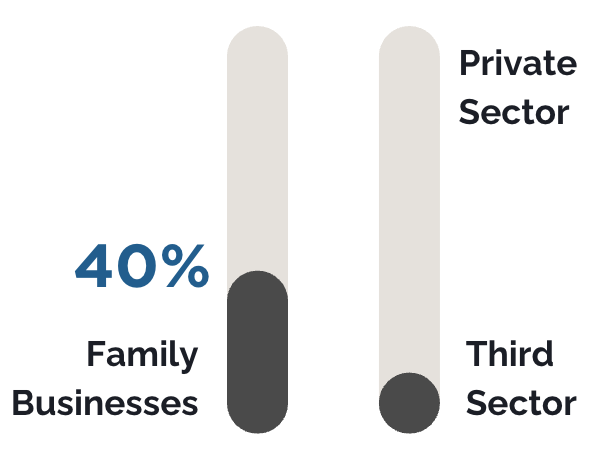
Industries
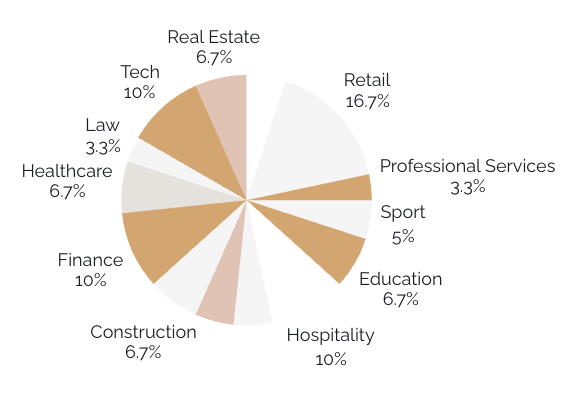
Describe our work in 3 words
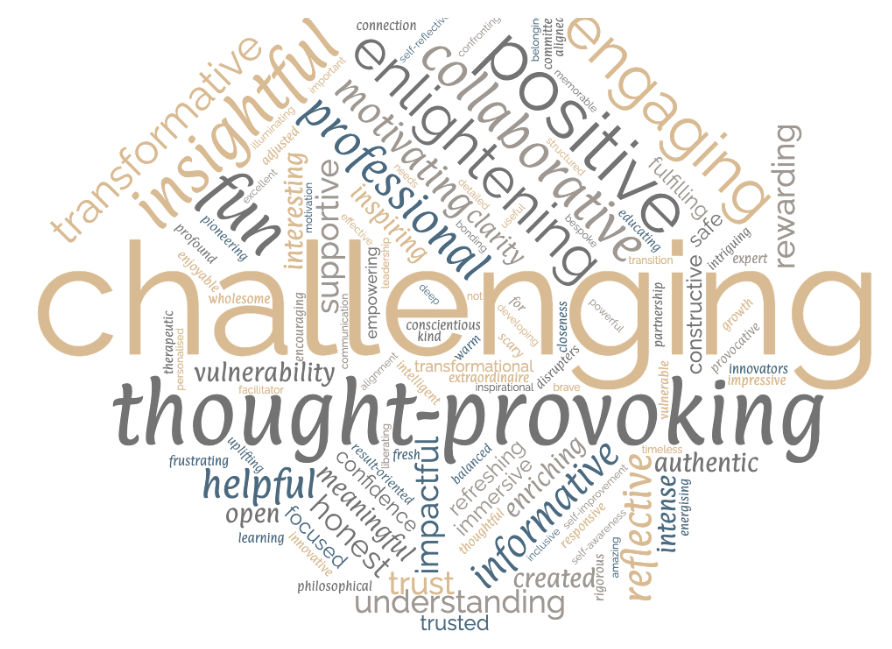
Significance of our impact
Those that rated us 7+ out of 10

Why Clients Chose to Work With Us
Before exploring the impact of our work over time, we asked people to reflect on what first brought them to us. What were the challenges, questions, or opportunities they remembered at the start of the journey?
Personal Impact
We asked people to reflect on the biggest personal shift they experienced through our work. Their responses speak to the deeper changes; greater awareness, confidence, connection, and capacity, that sit beneath the surface of organisational outcomes. It's in these individual touch points we believe longer term impact takes place. Here's the most significant personal shifts:
-
Improved emotional intelligence and ability to be more vulnerable
-
Improved relationships with colleagues and better culture in own team
-
Enhanced self-awareness around behavioural patterns, needs, gaps and capability
-
Enhanced confidence, resilience and adaptability
-
Advanced careers and supported leadership development skills
As mentioned by at least 25% of respondents
In their words...
Team/Organisational Impact
We asked clients to reflect on the most significant shifts they’ve seen in their teams and organisations as a result of our work. Their responses highlight greater alignment, trust and collaboration that drive performance and culture. Here are some of the most meaningful changes they shared:
-
Improved culture of trust and openness
-
Increased shared awareness, understanding and empathy
-
Better quality conversations around strategic and cultural shifts
-
Better ability to address and navigate the ongoing challenges and dilemmas of leadership
-
The development of leaders and emerging leaders
-
Improvement in culture and lived values
As mentioned by at least 25% of respondents
In their words...
We see evidence of impact when there's a shift in the quality of...
Learn more about the Collaboration Compass that underpins our approach.
Being
Leaders are aware of their reactive patterns of responding and are able to adapt to better support the needs of the group.
Relating
A leadership group is skilful in speaking to the tensions that exist between them with compassion and care for one another.
Thinking
A leadership team resists the temptation to rush to a solution and is curious about looking at the problem from different perspectives.
Doing
A leadership group regularly check-in on progress, reflect, learn and adapt to strategy as they go; meeting their goals sustainably.
Our research approach
To mark our 10-year milestone, we surveyed past and present clients to understand the longer-term impact of our work. Using the Most Significant Change method, we asked open, reflective questions about individual, team, and organisational shifts.
We reviewed our client history, then sent the survey to 355 people across 25 organisations, receiving 78 responses (just over 21%). To boost reach, we contacted people via LinkedIn and offered an Ecologi donation per response.
Acknowledging bias
We recognise those most likely to respond may hold positive views of RISE. To counter this, we asked what hadn’t worked and what could have had more impact.
Analysis
We identified themes across responses, cross-analysed by seniority and type of work, and explored links between intent and perceived impact using abductive reasoning. Insights were then shared with our wider consultant community for reflection and learning.
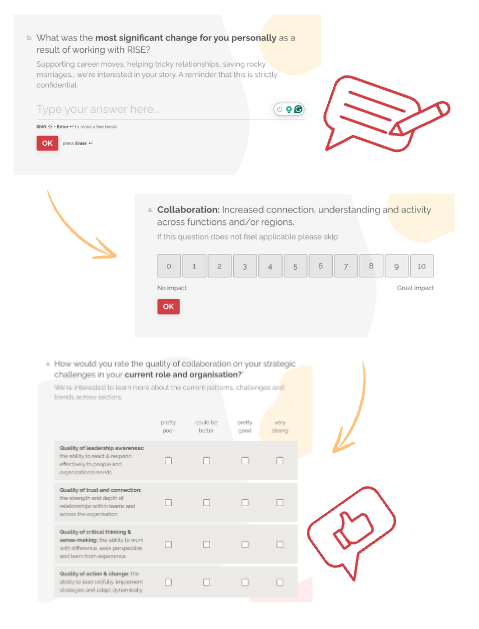
.png?width=120&height=120&name=RISE%20Logo%20(7).png)
%20(1).png?width=133&height=133&name=Compass%20Coasters%20(87%20x%2087%20cm)%20(1).png)